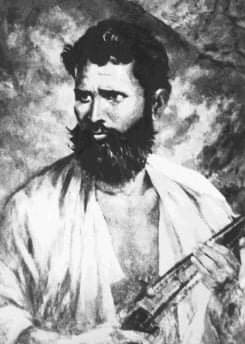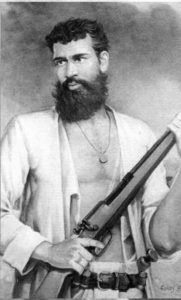His name was first proposed for Nhava Sheva port which was named after Jawaharlal Nehru because Rajiv Gandhi was in power!


Kreately Media today remembers and pays tributes to freedom fighter Vasudev Balwant Phadke on his Punyatithi. The British deported him to a jail at Aden in Yemen where he breathed his last this day, the 17th of February, in 1883. He was then aged 37 years.
Vasudev Balwant Phadke was born in Raigad, Maharashtra. He was mentored by freedom fighter Lahuji Vastad Salve, who motivated the youth to free the country from colonial rule. Salve was a wrestler; he taught Vasudev Balwant Phadke the art of wrestling. Phadke then learnt by himself the art of shooting, horse-riding, and fencing.
Vasudev Balwant Phadake was pioneer of Indian Revolutionary movement after rising of 1857. He was leader of resistance in Maharashtra, Nizam’s state and Karnataka. He earlier worked in military Secretariat of Pune as accountant. He had good knowledge of working and deployment of British troops was came Handy in his struggle. He was descendant of commander of Karnala Fort who was in service of Maratha empire. Vasudev Balwant Phadake was trained under legendary Ustad Lahuji Salve. He was also social worker and reformist who didn’t diferented between peoples on their caste. His comrades were from Koli, Bhil, Dhangar and Ramoshi community. He was co-founder of Puna Native Institute which later became Maharashtra Education Society which had total 77 colleges under till date.
In 1875, after the then Gaekwad ruler of Baroda was deposed by the British, Phadke launched protest speeches against the government. Severe famine coupled with the evident apathy of the British administration propelled him to tour the Deccan region, urging people to strive for a free republic. Unable to get support from the educated classes, he gathered a band of people from the Ramoshi caste. People from the Kolis, Bhils and Dhangars were also included later. He taught himself to shoot, ride and fence. He organised around 300 men into an insurgent group that aimed at liberating India from British rule. Phadke intended to build an army of own but lacking funds they decided to break into government treasuries. The first raid was done in a village called Dhamari in Shirur taluka in Pune district. The income tax which was collected for British Raj was kept in the house of local business man Balchand Fojmal Sankla. They attacked the house and took the money for the benefit of famine stricken villagers. There they collected about four hundred rupees but this led to his being branded as a dacoit. To save himself Phadke had to flee from village to village, sheltered by his sympathisers and well-wishers, mostly the lower class of the society. Impressed by his zeal and determination, the villagers of Nanagaum offered him protection and cover in the local forest. The general plot would be to cut off all the communications of British forces and then raid the treasury. The main purpose of these raids was to feed famine-affected farmer communities. Phadke performed many such raids in areas near Shirur and Khed talukas in Pune.
Meanwhile, the leader of Ramoshi, Daulatrav Naik, who was the main supporter of Phadke, headed towards the Konkan area on the western coast. On 10–11 May 1879, they raided Palaspe and Chikhali, looting around 1.5 lakh rupees. While returning towards Ghat Matha, Major Daniel attacked Naik, who was shot dead. His death was a setback to Phadke’s revolt: the loss of support forced him to move south to the Shri Shaila Mallikarjun shrine. Later, Phadke recruited about 500 Rohilas to begin a fresh fight.
Phadke’s plans to organise several simultaneous attacks against the British Raj nationwide were met with very limited success. He once had a direct engagement with the British in the village of ghanur, whereafter the government offered a bounty for his capture. Not to be outdone, Phadke in turned offered a bounty for the capture of the Governer of Bombay, announced a reward for the killing of each European, and issued other threats to the government. He then fled to Hyderabad to recruit Rohila and Arabs into his organisation. A British Major, Henry William Daniell and Abdul Haque, Police Commissioner to the Nizam of Hyderabad, pursued the fleeing Phadke day and night. The British move to offer a bounty for his capture met with success: someone betrayed Phadke, and he was captured in a temple after a fierce fight at the district of Kaladgi on 20 July 1879 while he was on his way to Pandharpur.
At the age of 30, Phadke organized an army of 300 people, comprising of Ramoshis, Kolis, Bhils and Dhangars. He did not get support from the educated Hindus of his region. As he did not have funds, he raided British treasuries, to buy weapons. He also helped the famine-affected villagers with the collected funds. He successfully led several raids in the Pune region. The British labelled him as a dacoit. Phadke recruited another band of 500 Rohilas and trained them in the art of warfare. With 800 men, Phadke was all geared up for war against the British. He, along with his men, started attacking British posts. He even declared big rewards to anyone who could capture the British Governor of Bombay or kill British officers. He led a surprise attack on Pune, defeating the British and getting hold of the city for a few days.
The British offered a big reward for Phadke’s capture. A traitor gave information about his whereabouts to the British. Before he was caught, Phadke encountered the British in a fierce battle at Kaladgi near a temple. It was 20 July 1879. The British deported him to Aden where he was jailed. Phadke escaped from his jail cell, taking the door off from its hinges. It was 13 February 1883. He was recaptured. He breathed his last at Aden jail on 17th February 1883.
From here he was taken to Pune for trial. Ganesh Vasudev Joshi, also known as Sarvajanik Kaka, defended his case. Phadke and his comrades were housed in the district session court jail building, near Sangam bridge, which now happens to be the state C.I.D. building. His own diary provided evidence to have him sentenced for life. Phadke was transported to jail at Aden, but escaped from the prison by taking the door off from its hinges on 13 February 1883. He was soon recaptured and then went on a hunger strike, dying on 17 February 1883.

Remembering the lakhs of warriors and freedom fighters will be a tribute to them and thanking them for the freedom we enjoy today.Revolutionary such as Vasudev Balwant Phadke, he was awakening people against the British rulers.
DISCLAIMER: The author is solely responsible for the views expressed in this article. The author carries the responsibility for citing and/or licensing of images utilized within the text.
